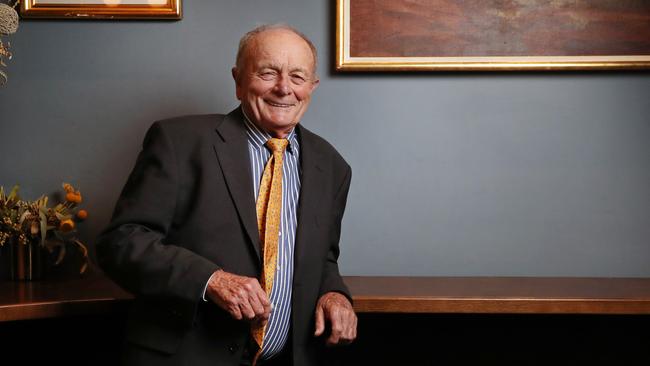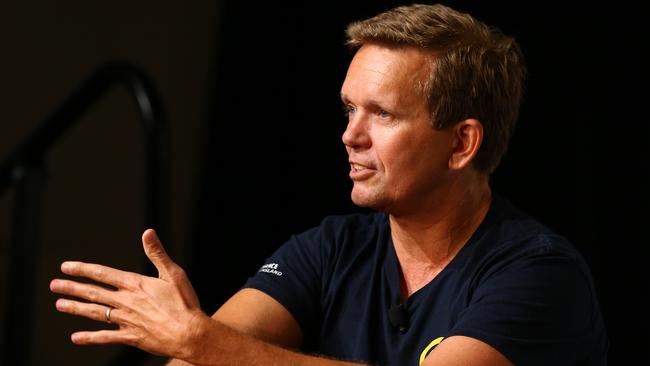Activist short selling attacks can be brutal, even illegal, so should regulators be doing more?
There are calls for a more proactive approach from regulators against activist short sellers, such as those who targeted Blue Sky. But wielding a bigger stick is not that simple.

Harvey Norman chairman Gerry Harvey thinks they should be strung up.
Shareholders in plenty of other companies – Rural Funds Group, Wisetech, Treasury Wine Estates – might agree.
While on the other hand there is an argument that short sellers – who borrow shares in a company with a view to profiting when the share price falls – perform a useful function in share price discovery, testing the assertions made by company management, and in some cases catching out those who have been over-egging the pudding, or flat out lying.
The fact that it’s possible to profit from the failure or at least the share price decline of a sharemarket-listed company seems to run counter to the capitalist project.
Isn’t the idea that we back aspiration, not bet on the opposite proposition or actively try to push a company towards ruin?
Putting philosophy aside, there is certainly a dark side to the short selling world.
As a way of making money, it is obviously ethically fraught, but the practice also highlights exploitable weaknesses in our legal system, for which there are probably no easy fixes.
Should a company be targeted by short sellers – in what is often called a short attack or in more malicious cases a “short and distort’’ manoeuvre – they are often forced into a wholly defensive posture, with little legal recourse open to them.
The issue was thrown into sharp relief again this week, when The Australian revealed that former Blue Sky Alternative Investments managing director Mark Sowerby had launched legal action against several parties he alleges conspired to profit from making false claims about the former ASX-listed investment management firm, which eventually caused it to fail.
The claim is not unique in its intention to hold short sellers to account – Rural Funds Management won a case against a company, Bonitas Research, operated by one of the defendants in the Blue Sky matter, Matthew Wiechert, back in 2020.
However, the fact that such cases are exceedingly rare, despite the often massive amounts of money involved, indicates the difficulty in bringing them on.

The roadblocks are many.
Firstly, short selling is not illegal. What is illegal is misleading and deceptive conduct, and it is also illegal to conspire to do harm to another.
A conspiracy exists “if two or more persons agree to effect an unlawful purpose, whether as an end or as a means to an end, and in the carrying out of that agreement damage is caused to another’’ – a definition that came out of a historic Ansett case.
But proving a conspiracy is exceedingly difficult, and even if you can make out your claim to conspiracy or misleading and deceptive conduct, where to from there?
Glaucus and other activist short sellers have made it a practice to base themselves in the US – thereby claiming a robust free speech defence – or other jurisdictions where our corporate regulator or local legal decisions carry no weight.
And should you succeed in Australian courts, enforcing a judgment can be nigh on impossible, with the companies running these attack strategies invariably devoid of assets, legal sources say.
It’s an issue Rural Funds Group knows all too well.
In a panel discussion hosted by the ASX, the company’s general manager, investor relations James Powell recounted how their shares fell more than 40 per cent in 40 minutes – before being halted from trade – on the back of a tweet from Texas-based Bonitas, which had published a 31 page report valuing their stock at zero.
“The day the short report appeared, 6 August, 2019, I was preparing for a webinar for one of our other investments,’’ he says.
“I remember it quite vividly because my mobile phone rang and at the same time, my landline rang, back in the days when you had a landline.
“I looked up at my computer and I saw emails flooding in all with the words ‘short report’ in the subject line.
“That was about 10.38am. As it turns out, a tweet was put out by the short reporter, who said he thought we were a fraud. So it was really serious from the start.’’
Mr Powell said he immediately headed to the managing director’s (David Bryant’s) office.
“Our immediate reaction was absolute shock and disbelief.’’
Having rapidly refuted the claims in a release to the ASX the following day, the company then held an investor webinar. Such events usually attracted about 50 attendees. This one had more than 1000, including retail and institutional investors and media.
Rural Funds Group’s response – beyond the long process of reassuring its shareholders and regaining market confidence – was unusual in that it decided to take Bonitas Research to court.
Bonitas director Matthew Wiechert is also a director of Glaucus Research, which allegedly perpetrated the Blue Sky attack, and has been named in Mr Sowerby’s case.
Rural Funds Group won the case, and Bonitas simply didn’t show up.
The judge in the matter found that “neither Bonitas nor Wiechert took the trouble to check with or inquire of Rural Funds Group as to any of the matters which they broadcast’’.
“They had an obvious commercial interest in depressing the price. I have no difficulty in concluding that they did not care whether what they were saying was false.’’

It was a Pyrrhic victory, however. Rural Funds Group was awarded more than $900,000 in damages and costs, but has not been paid a cent.
And the disdain with which Bonitas treated the process was all too apparent.
In a letter to Rural Funds’ lawyer, Clayton Utz partner Kym Fraser, which Bonitas published on its website, they thumbed their nose at the then-pending legal action.
“We respectfully decline the invitation,’’ Mr Wiechert wrote.
“Australian courts have no jurisdiction over us, and we will contest the enforcement of any orders or judgments you obtain that certainly will be contrary to the discoverable facts, as well as United States and Texas law and policy.”
Mr Wiechert even returned serve, saying he would go after the company for defamation.
“We appreciate we will have to meet a malice standard, but we are more confident than ever that we can do so,’’ he wrote.
“Please confirm that you or your client’s Texas counsel will voluntarily accept service of a complaint which, unlike yours, clearly would have no jurisdictional infirmities.’’
Mr Fraser told The Australian this week that short activists invariably domiciled themselves overseas, to make enforcement difficult.
He said Rural Funds Group made a point of taking the matter to court partly as one of the planks of rehabilitating the company’s reputation, and also as a matter of principle.
Mr Fraser said there were sensible rules in place for run-of-the-mill short traders, “but the problem is where there is an orchestrated campaign to deliberately, dramatically drop the price … and that’s accompanied by false and misleading statements that are provided to the market’’.
Mr Fraser said he could understand the challenge faced by regulators such as ASIC, and their reluctance to opine on the accuracy of information provided to the market in real time.
“But I do think what was perhaps missing from that case, was really the signal to the market about strong regulatory action for wrongdoing – which I think is clearly offensive market manipulation – there really wasn’t that piece to it.
“I think that remains the missing piece – where a company establishes really egregious wrongful conduct, then I think the regulator should be seen, and actually actively doing something in the prosecution of that after the event.’’
Mr Fraser said Bonitas’s conduct, as laid out in the judgment in the matter, was “appalling’’, but the short seller got the result they were after, which was to make a substantial profit.
Law firm Herbert Smith Freehills agrees with Mr Fraser’s analysis, publishing an opinion to the effect that ASIC should be seen to be more on the front foot.
“We believe that the market would benefit from ASIC taking action on behalf of affected security holders in the Rural Funds matter, particularly in circumstances where the court has already held that the conduct amounted to a contravention of the Corporations Act,’’ it wrote at the time.
“Doing so would give ASIC the opportunity to remedy the loss of affected shareholders, focus the minds of short sellers publishing research and secure further jurisprudence in this emerging area.
“To date, the corporate regulator appears to have largely let these situations play out on the grounds that the short sellers have a role to play in correcting market inefficiencies. The weight of that view must be balanced against protecting markets from being misled or even manipulated.’’
Sources The Australian spoke to for this story were of one mind that ASIC, and other regulators, were understandably happy to let corporations, or indeed other well-heeled parties such as litigation funders, take the lead in prosecuting such matters through the courts, given their own finite resources. The futility in chasing down an overseas-domiciled actor, with little hope of enforceable recourse should you win, is also widely accepted. However a more proactive stance, particularly given that the same names often pop up when these attacks arise, would be welcomed. ASIC declined to comment.
Mr Harvey told The Australian this week there was “a real problem in Australia with people manipulating the ASX market masquerading as legitimate ‘‘short sellers’’. “These people target Australian companies using false information, fake shareholder activists and friends in the media.”




To join the conversation, please log in. Don't have an account? Register
Join the conversation, you are commenting as Logout